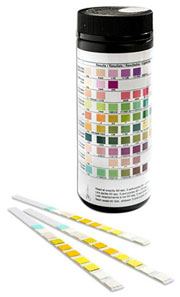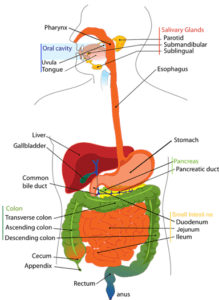Are you curious about your urine?
- Just exactly what is urine?
- Where does urine come from?
- What does our urine tell us about our general health?

What’s in my urine?
Urine is a cocktail of substances your body no longer requires!
People sometime ask why, when you eat and drink – some comes out in the urine and some in the faeces – or the pee and the poo, to be more exact!
This is a very logical question. Let’s start with some basic information about the way your body works.
You and your digestion
Everything we eat and drink passes through the mouth to the stomach, where it is digested – digestion means the food is broken down into tiny particles. These digested food and drink particles, then travel through the intestines. By now they are very tiny, and can pass inside the walls of your gut, and into miniature blood vessels, called capillaries.
The blood then passes directly from the walls of the intestines, to the liver, where it undergoes a process of detoxification. The liver acts as a huge filtration system – breaking down unwanted substances, chemicals, drugs, and alcohol – and then excretes its waste products in bile. The bile is squirted through the bile ducts, back into the intestines.
Bile is a green, or dark brown body fluid, you occasionally see when you vomit. When bile mixes with the food and drink residue in your stomach, this is what gives poo its brown colour.
The brown comes from the iron pigment in red blood cells, which are inevitably destroyed in the liver detoxification process. This is completely normal.
You and your kidneys
Away from the liver, blood is also circulating around the body and passing through the kidneys. The kidneys are also involved in the break down of different substances such as carbohydrates, proteins, and lipids. Many different types of medication are also broken down in the kidney. However, one of their most important functions is to regulate the amount of fluid in your body.
The kidneys do this by regulating your sodium levels. Too much sodium, and you absorb more water to dilute the blood. Too little sodium and you absorb less water to concentrate the blood again.
This why when you feel thirsty – your blood sodium levels are raised, and your body is telling you, you need more fluid.
Conversely if you drink too much, your sodium levels go down, and you will pass a lot of urine as your body tries to get rid of excess fluid, to increase your blood sodium levels again.
So, what IS in my urine?
So you can see from all this, your urine contains water, plus a whole range of metabolic waste products, which derive from both your liver and your kidney.
A 2013 scientific study has revealed more than 3000 products in urine. These are listed in the Urine Metabolome Database. These are the metabolic breakdown products of hormones, vitamins, and enzymes. It also contains contaminants, from environmental products, food, drinks, drugs, and bacteria.
What colour should my urine be?
Urine is normally pale yellow. It contains urobilin, which is a bilirubin breakdown product, and originates from the liver. Your urine will look darker if you are dehydrated.
If the urine changes colour:
Orange – this may be due to: high dose Vitamin B12, or for example the drugs phenazopyridine, or isoniazid, or, this could signify a liver or kidney problem. You should see your doctor
Pink/red – may be due to: eating too many/too much carrots, beetroot, rhubarb; or to the drugs rifampicin, or phenazopyridine; or it may be due to blood in the urine. You should see a doctor. Blood in the urine can signify a serious cause, such as kidney disease, a urine infection, prostate disease, or a bladder tumour, and might appear once, sporadically, or persistently.
How much urine should I pee?
Most healthy adults produce around 2L of urine per day – but this does vary depending on how much fluid you consume, what you eat, how much you sweat etc ..
How often should I pee?
The average person has a pee about 6 or 7 times a day. Between 4 and 10 times is normal.
This is assuming an average fluid intake of 2 litres per day.
Sometimes people become aware they are passing urine more frequently. This can be a sign of:
- Urinary tract infection
- Diabetes
- Pelvic organ prolapse
- Ageing
- Hormone deficiency (after menopause)
- Prostate disease
- Pressure on the bladder from a mass in the abdomen
- Overactive bladder
- Bladder cancer
If you are concerned about passing urine too frequently it’s important to discuss this with your doctor.
When would I know there is something wrong with my urine?
You may have a medical condition if any of the following symptoms apply:
- Increased frequency of passing urine
- Smelly urine
- Blood in your urine
- Urine changes colour
- Pain passing urine
- Getting up at night to pass urine
- Incontinence
If you experience any of these symptoms, you should see your doctor.
What can urine be tested for?

When you go the doctor’s, they often do is ask for a urine specimen. They can test the urine very easily there and then, and this gives a good indication if anything is wrong.
To do this they use urine dipsticks. Urine dipsticks are thin, plastic strips which can be dipped into your urine and give instant results. They have little coloured squares on them, which change colour if certain disease markers are present. Urine tests are also available to buy online.
Urine dipsticks test for:
- Calcium – may indicate kidney stones, or parathyroidism.
- Blood – may indicate urine infection cystitis, kidney/bladder infections/stones/blockages, tumours in the renal tract, medications, prostate disease, or blood disorders. Sometimes urine may just be contaminated with menstrual blood.
- Glucose – may indicate diabetes, pregnancy, renal glycosuria.
- Urobilinogen – may indicate hepatitis, cirrhosis, liver damage, haemolytic anaemia.
- Bilirubin – may indicate liver disease, heavy drinking alcohol, fatty liver, diabetes.
- Ketones – may indicate dehydration, a low carbohydrate diet, chronic vomiting and diarrhoea, an eating disorder, pregnancy.
- Nitrates- kidney/bladder infection
- Leucocytes – kidney/bladder infections/stones.
- Creatinine – kidney failure.
- Microabumin – diabetes, high blood pressure.
- pH – a neutral pH is 7.0. The higher the number, the more basic (alkaline) it is. The lower the number, the more acidic your urine is. The average urine sample tests at about 6.0.
- Ascorbic acid – if a dipstick test is positive for ascorbic acid, this means the result of the test may be unreliable.
- Protein – fever, dehydration, kidney disease, kidney infection, plus many more.
Are drugs and alcohol detectable in the urine?
Below are listed some of the drugs that can be detected in the urine, and the time-frame.
If you are involved in a car accident, or part of a Police investigation, these are often tested for:
- Alcohol: 3–5 days
- Amphetamines: 1–3 days
- Barbiturates: 2–4 days
- Benzodiazepines: 3–6 weeks
- Cannabis: 7–30 days
- Cocaine: 4 days
- Codeine: 1 day
- Heroin: 3–4 days
- LSD: 1–3 days
- MDMA (ecstasy): 3–4 days
- Methamphetamine (crystal meth): 3–6 days
- Methadone: 3–4 days
- Morphine: 2–3 days
Are sexually transmitted infections (STI’s) diagnosed from a urine sample?
Yes they are. If you visit a Sexual Health Clinic in the UK, urine tests are frequently used to test for chlamydia and gonorrhoea.
If you have no symptoms
In men, a first pass urine test is required. You must not have passed urine for a minimum of 2 hours before you give the sample, and it is the first part of the stream.
In women, they are often asked to do a swab themselves from the vulvo-vaginal area.
If you have symptoms
You do need to be examined, and swabs may be taken. Although these are small, cotton tipped swabs (like a small cotton bud) and only usually causes a mild discomfort.
Some STI’s such as syphilis, HIV, and hepatitis B and C, require a blood test.
Is a pregnancy test a urine test?
Yes – you can test for a pregnancy with a urine sample. This is best done if your period is at least 7 days overdue, or as a minimum 21 days after unprotected sex. Do the test on an early morning urine sample.
The pregnancy test detects the level of the pregnancy hormone Human Chorionic Gonadotrophin (HCG) in the urine. Some tests claim to be 99% accurate – however, do not rely on a test done too early, as this may give a false negative result.
Summing up
You can see from this blog post, what’s in your urine, can give a good indication of your general health!
Testing the urine can be a very useful clinical tool. In the future urine testing may even be used to detect cancers. Research teams are currently trialling a urine test to detect bladder cancer.
How to have happy kidneys and happy urine!
Stick to the six principles below and keep your kidneys healthy and happy!
- Drink plenty of fluids.
- Follow a healthy diet.
- Have your blood pressure checked.
- Control your BMI.
- Stop smoking.
- Only drink alcohol within recommended limits.
For more information see NHS – Keeping your kidneys healthy and Medlineplus – Urine and Urination.




